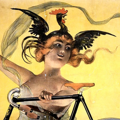(original com links → sol2070.in/2024/04/A-profecia-de-Fahrenheit-451 )
O livro "Fahrenheit 451" (1953), do mestre Ray Bradbury, é outra clássica ficção distópica que demonstra o poder profético de ficções especulativas de mais de 70 anos atrás.
Não sei porque demorei tanto para ler, já que alguns contos fantásticos de Bradbury me impactaram ainda na adolescência.
O futuro que ele imaginou em 1953 parece muito próximo, se já não estiver acontecendo. Os horrores de um governo hediondo são camuflados através de um embotamento generalizado das pessoas. Livros são queimados como objetos proibidos e as pessoas que os possuem são condenadas como subversivas.
Acompanhamos a trajetória de Guy Montag, um dos agentes militares responsáveis por essa incineração e perseguição — tarefas que passaram a ser responsabilidade dos bombeiros. É uma das mais poderosas histórias de conversão que já vi, concentrando todo o talento de Bradbury como um mágico contador de histórias.
Apesar de o foco ser o poder dos livros, fica claro que sua extinção é apenas um dos aspectos da estupidificação geral. Alguns outros mencionados: a distração de reality shows interativos, um fone de ouvido constantemente despejando entretenimento no cérebro, a obsessão com carros, máquinas e publicidade, o fim de conversas que vão além de trivialidades óbvias e a condenação instantânea de qualquer questionamento maior.
Assim como no "Admirável Mundo Novo" de Huxley, repressão explícita é desnecessária. Basta apresentar uma confortável direção de menor esforço, sem alternativas reais, que as pessoas irão cega e voluntariamente obedecer.
Não é preciso ser nenhum velho saudosista ranzinza para perceber um padrão semelhante atualmente. Alguns exemplos inofensivos ou até bobos — mas que somados sugerem algo alarmante — que me vêm automaticamente à mente:
- A geração mais jovem não sabe lidar com programas de computadores diferentes de aplicativos de celular.
- Influenciadores de Youtube e cia estão virando fontes primárias de informação. Ou seja, nem textos mais são lidos, quanto mais livros — sem falar no aspecto de desinformação, intencional ou não.
- Cada vez mais conversas e cobertura midiática sobre reality shows e pessoas famosas.
- Culto a produtos, corporações e bilionários.
- Reportagens na web vêm na forma de itens explicativos, como se fossem mensagens instantâneas, ou até “stories” verticais.
- Escrever textos elementares requer a assistência de IA (o que torna as habilidades de estudantes ainda mais rudimentares, conforme esse estudo).
- Pela primeira vez em um século, o quociente de inteligência está diminuindo (no país mais rico do mundo, os EUA).
- Preferência por conteúdo estrangeiro dublado (OK, isso é muito justificável e irrelevante. Mas chama a atenção porque há apenas 25 anos sessão de cinema dublada era exclusiva para crianças).
- E muitos outros.
Ao considerar uma possível estupidificação, o ponto não é sublinhar a superioridade de determinado tipo de cultura, prática ou conhecimento. A crítica é que isso atende perfeitamente os interesses de corporações e poderosos em geral para que nada mude, como em "Fahrenheit 451". Não só atende, mas há um tipo de auto-organização da cultura sob o atual sistema político-econômico que resulta nisso.
Ou por que a extrema-direita rejeita com tanta força a obra do educador Paulo Freire ou até o mero foco em políticas de educação? Porque isso gera questionamento e pensamento crítico em relação ao modo como as coisas estão — estão assim por motivos bem particulares, não é que elas são ou têm que ser assim. Entretenimento barato e confortos da modernidade, casados com estrangulamento socioeconômico, bloqueiam esse tipo de reflexão, impedindo até a ideia da possibilidade de mudança.
Não é por acaso que essas distopias proféticas clássicas como "1984" (1949), "Admirável Mundo Novo" (1932) e "Fahrenheit 451" (1953) tenham surgido praticamente na mesma época. Foi quando o controle de massas com determinado tipo de cultura e consumo começou a se mostrar extremamente eficiente.










